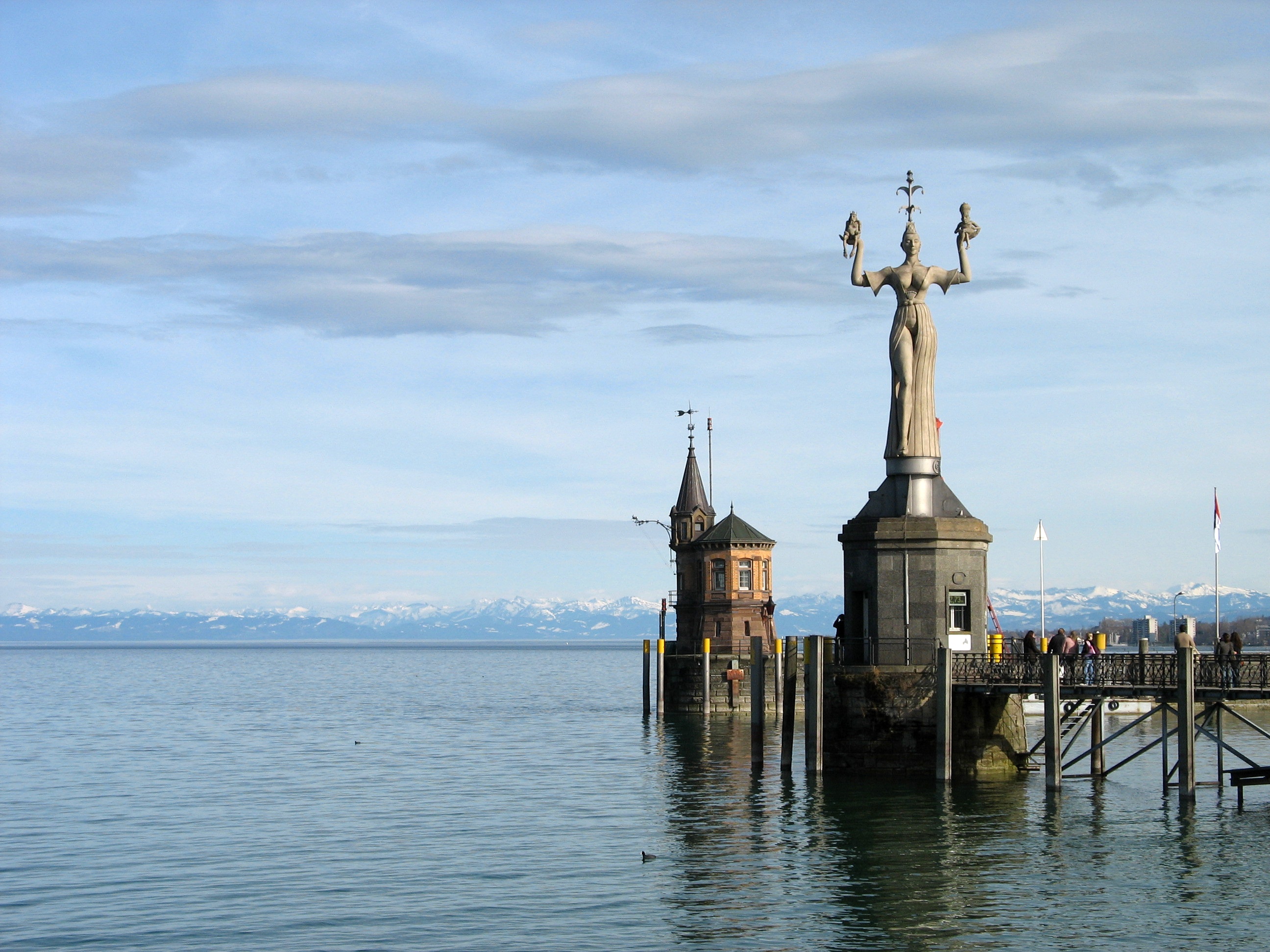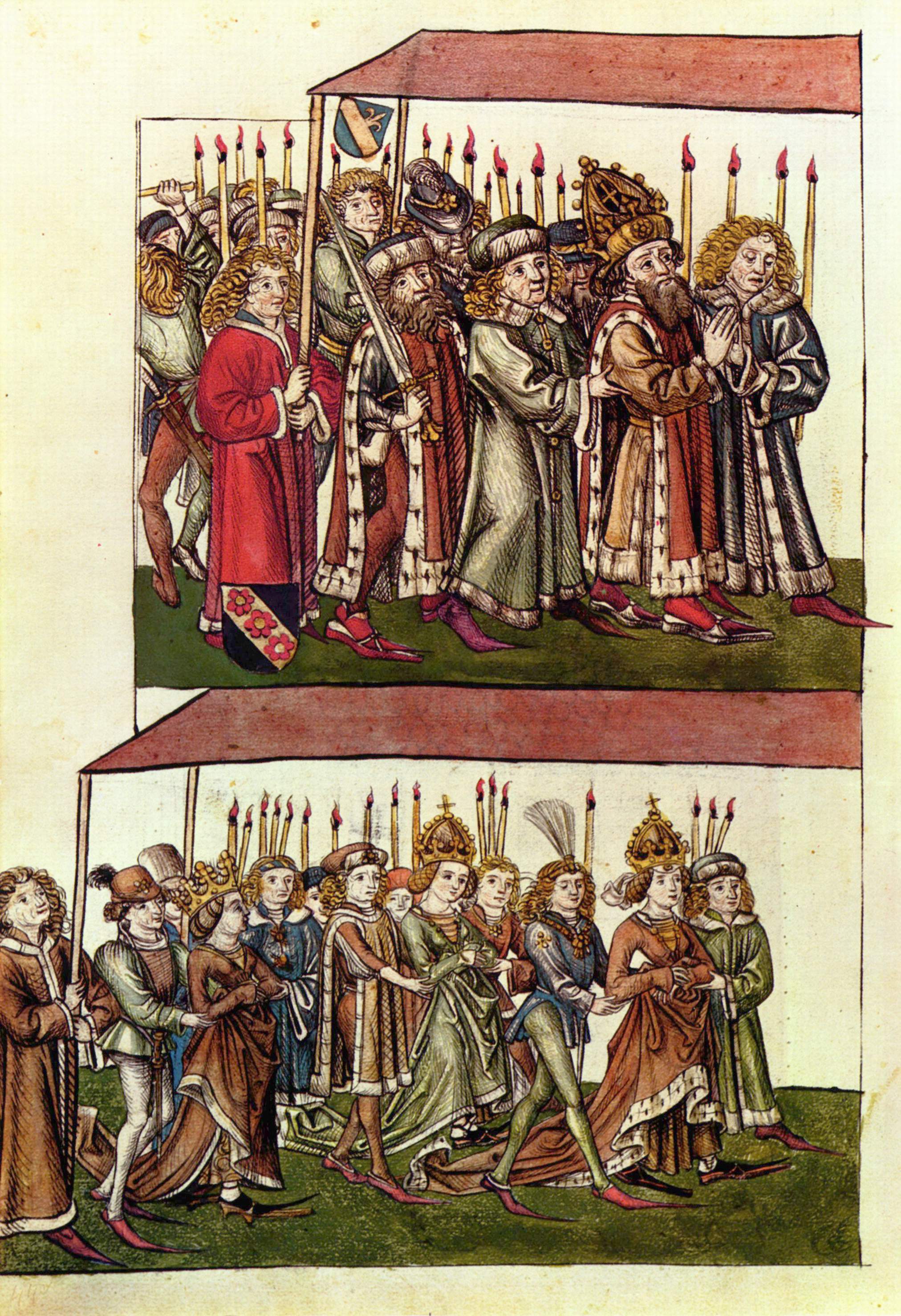|
Federico Frezzi
Federico Frezzi ( Foligno, 14th century - Konstanz, 1416) was Italian poet and bishop.Kleinhenz,Ch. "Medieval Italy: An Encyclopedia" pg 389 He entered the Dominican order, studied in Florence, he became professor of theology in various Italian universities and gathered various important positions in church. In year 1403 Frezzi became bishop of Roman Catholic Diocese of Foligno, he was also a member of council of Constance. The most important work of poetry of Frezzi is long didactic epic ''Il Quadriregio'', imitating Dante's Divine Comedy The ''Divine Comedy'' ( it, Divina Commedia ) is an Italian narrative poem by Dante Alighieri, begun 1308 and completed in around 1321, shortly before the author's death. It is widely considered the pre-eminent work in Italian literature .... References External links * 1416 deaths Italian poets Italian male poets Bishops of Foligno Year of birth unknown 15th-century Italian Roman Catholic bishops {{italy-RC-bish ... [...More Info...] [...Related Items...] OR: [Wikipedia] [Google] [Baidu] |
Foligno
Foligno (; Southern Umbrian: ''Fuligno'') is an ancient town of Italy in the province of Perugia in east central Umbria, on the Topino river where it leaves the Apennines and enters the wide plain of the Clitunno river system. It is located south-east of Perugia, north-north-west of Trevi and south of Spello. While Foligno is an active bishopric, one of its civil parishes, San Giovanni Profiamma, is the historical site of the former bishopric of Foro Flaminio, which remains a Latin Catholic titular see. Foligno railway station forms part of the main line from Rome to Ancona, and is the junction for Perugia; it is thus an important rail centre, with repair and maintenance yards for the trains of central Italy, and was therefore subjected to severe Allied aerial bombing in World War II, responsible for its relatively modern aspect, although it retains some medieval monuments. Of its Roman past no significant trace remains, with the exception of the regular street plan o ... [...More Info...] [...Related Items...] OR: [Wikipedia] [Google] [Baidu] |
Konstanz
Konstanz (, , locally: ; also written as Constance in English) is a university city with approximately 83,000 inhabitants located at the western end of Lake Constance in the south of Germany. The city houses the University of Konstanz and was the residence of the Roman Catholic Diocese of Konstanz for more than 1,200 years. Location The city is located in the state of Baden-Württemberg and situated at the banks of Lake Constance (''Bodensee'' in German). The river Rhine, which starts in the Swiss Alps, passes through Lake Constance and leaves it, considerably larger, by flowing under a bridge connecting the two parts of the city. North of the river lies the larger part of the city with residential areas, industrial estates, and the University of Konstanz; while south of the river is the old town, which houses the administrative centre and shopping facilities in addition to the ''Hochschule'' or the ''University of Applied Sciences''. Car ferries provide access across Lake C ... [...More Info...] [...Related Items...] OR: [Wikipedia] [Google] [Baidu] |
Italians
, flag = , flag_caption = Flag of Italy, The national flag of Italy , population = , regions = Italy 55,551,000 , region1 = Brazil , pop1 = 25–33 million , ref1 = , region2 = Argentina , pop2 = 20–25 million , ref2 = , region3 = United States , pop3 = 17-20 million , ref3 = , region4 = France , pop4 = 1-5 million , ref4 = , region5 = Venezuela , pop5 = 1-5 million , ref5 = , region6 = Paraguay , pop6 = 2.5 million , region7 = Colombia , pop7 = 2 million , ref7 = , region8 = Canada , pop8 = 1.5 million , ref8 = , region9 = Australia , pop9 = 1.0 million , ref9 = , region10 = Uruguay , pop10 = 1.0 ... [...More Info...] [...Related Items...] OR: [Wikipedia] [Google] [Baidu] |
Poet
A poet is a person who studies and creates poetry. Poets may describe themselves as such or be described as such by others. A poet may simply be the creator ( thinker, songwriter, writer, or author) who creates (composes) poems ( oral or written), or they may also perform their art to an audience. The work of a poet is essentially one of communication, expressing ideas either in a literal sense (such as communicating about a specific event or place) or metaphorically. Poets have existed since prehistory, in nearly all languages, and have produced works that vary greatly in different cultures and periods. Throughout each civilization and language, poets have used various styles that have changed over time, resulting in countless poets as diverse as the literature that (since the advent of writing systems) they have produced. History In Ancient Rome, professional poets were generally sponsored by patrons, wealthy supporters including nobility and military officials. F ... [...More Info...] [...Related Items...] OR: [Wikipedia] [Google] [Baidu] |
Bishop
A bishop is an ordained clergy member who is entrusted with a position of authority and oversight in a religious institution. In Christianity, bishops are normally responsible for the governance of dioceses. The role or office of bishop is called episcopacy. Organizationally, several Christian denominations utilize ecclesiastical structures that call for the position of bishops, while other denominations have dispensed with this office, seeing it as a symbol of power. Bishops have also exercised political authority. Traditionally, bishops claim apostolic succession, a direct historical lineage dating back to the original Twelve Apostles or Saint Paul. The bishops are by doctrine understood as those who possess the full priesthood given by Jesus Christ, and therefore may ordain other clergy, including other bishops. A person ordained as a deacon, priest (i.e. presbyter), and then bishop is understood to hold the fullness of the ministerial priesthood, given responsibil ... [...More Info...] [...Related Items...] OR: [Wikipedia] [Google] [Baidu] |
Dominican Order
The Order of Preachers ( la, Ordo Praedicatorum) abbreviated OP, also known as the Dominicans, is a Catholic mendicant order of Pontifical Right for men founded in Toulouse, France, by the Spanish priest, saint and mystic Dominic of Caleruega. It was approved by Pope Honorius III via the papal bull '' Religiosam vitam'' on 22 December 1216. Members of the order, who are referred to as ''Dominicans'', generally carry the letters ''OP'' after their names, standing for ''Ordinis Praedicatorum'', meaning ''of the Order of Preachers''. Membership in the order includes friars, nuns, active sisters, and lay or secular Dominicans (formerly known as tertiaries). More recently there has been a growing number of associates of the religious sisters who are unrelated to the tertiaries. Founded to preach the Gospel and to oppose heresy, the teaching activity of the order and its scholastic organisation placed the Preachers in the forefront of the intellectual life of the M ... [...More Info...] [...Related Items...] OR: [Wikipedia] [Google] [Baidu] |
Florence
Florence ( ; it, Firenze ) is a city in Central Italy and the capital city of the Tuscany region. It is the most populated city in Tuscany, with 383,083 inhabitants in 2016, and over 1,520,000 in its metropolitan area.Bilancio demografico anno 2013, datISTAT/ref> Florence was a centre of medieval European trade and finance and one of the wealthiest cities of that era. It is considered by many academics to have been the birthplace of the Renaissance, becoming a major artistic, cultural, commercial, political, economic and financial center. During this time, Florence rose to a position of enormous influence in Italy, Europe, and beyond. Its turbulent political history includes periods of rule by the powerful Medici family and numerous religious and republican revolutions. From 1865 to 1871 the city served as the capital of the Kingdom of Italy (established in 1861). The Florentine dialect forms the base of Standard Italian and it became the language of culture throug ... [...More Info...] [...Related Items...] OR: [Wikipedia] [Google] [Baidu] |
Roman Catholic Diocese Of Foligno
The Diocese of Foligno ( la, Dioecesis Fulginatensis) is a Latin Church ecclesiastical territory or diocese of the Catholic Church in Umbria, Italy. It is a suffragan diocese in the ecclesiastical province of the metropolitan Archdiocese of Perugia-Città della Pieve."Diocese of Foligno" '''. David M. Cheney. Retrieved February 29, 2016."Diocese of Foligno" ''GCatholic.org.'' Gabriel Chow. Retrieved February 29, 2016. History Tradition has it that Christianity was in ...[...More Info...] [...Related Items...] OR: [Wikipedia] [Google] [Baidu] |
Council Of Constance
The Council of Constance was a 15th-century ecumenical council recognized by the Catholic Church, held from 1414 to 1418 in the Bishopric of Constance in present-day Germany. The council ended the Western Schism by deposing or accepting the resignation of the remaining papal claimants and by electing Pope Martin V. It was the last papal election to take place outside of Italy. The council also condemned Jan Hus as a heretic and facilitated his execution by the civil authority, and ruled on issues of national sovereignty, the rights of pagans and just war, in response to a conflict between the Grand Duchy of Lithuania, Kingdom of Poland (1385–1569), Kingdom of Poland and the Teutonic Knights, Order of the Teutonic Knights. The council is also important for its relationship to ecclesial conciliarism and Papal supremacy. The council's decrees were formally annulled by Pope Sixtus IV in 1478. Origin and background The council's main purpose was to end the Papal schism which had ... [...More Info...] [...Related Items...] OR: [Wikipedia] [Google] [Baidu] |
Divine Comedy
The ''Divine Comedy'' ( it, Divina Commedia ) is an Italian narrative poem by Dante Alighieri, begun 1308 and completed in around 1321, shortly before the author's death. It is widely considered the pre-eminent work in Italian literature and one of the greatest works of world literature. The poem's imaginative vision of the afterlife is representative of the medieval worldview as it existed in the Western Church by the 14th century. It helped establish the Tuscan language, in which it is written, as the standardized Italian language. It is divided into three parts: '' Inferno'', '' Purgatorio'', and '' Paradiso''. The narrative takes as its literal subject the state of the soul after death and presents an image of divine justice meted out as due punishment or reward, and describes Dante's travels through Hell, Purgatory, and Heaven. Allegorically, the poem represents the soul's journey towards God, beginning with the recognition and rejection of sin (''Inferno''), fol ... [...More Info...] [...Related Items...] OR: [Wikipedia] [Google] [Baidu] |
1416 Deaths
Year 1416 ( MCDXVI) was a leap year starting on Wednesday (link will display the full calendar) of the Julian calendar. Events January–December * January 27 – The Republic of Ragusa is the first state in Europe to outlaw slavery. * May 29 – Battle of Gallipoli: Venetian admiral Pietro Loredan destroys the Ottoman fleet. * May 30 – The Catholic Church burns Jerome of Prague as a heretic. Date unknown * The Trezzo sull'Adda Bridge (the longest arch bridge in the world at the time) is destroyed. * The Hussite Bible is completed by Tamás Pécsi and Bálint Újlaki. Births * February 26 – Christopher of Bavaria (d. 1448) * March 27 – Antonio Squarcialupi, Italian organist and composer (d. 1480) * March 28 – Jodha of Mandore, Ruler of Marwar (d. 1489) * May 25 – Jakobus, nobleman from Lichtenberg in the northern part of Alsace (d. 1480) * October 26 – Edmund Grey, 1st Earl of Kent (d. 1490) * ''date unknown'' ** ... [...More Info...] [...Related Items...] OR: [Wikipedia] [Google] [Baidu] |








